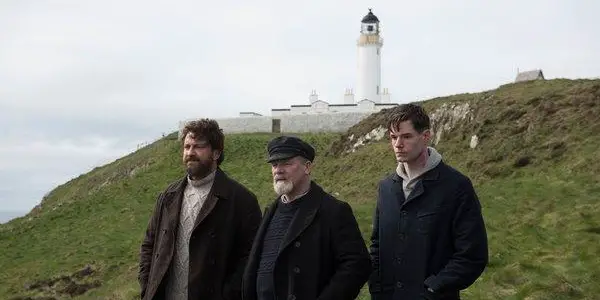I may not have an overwhelming urge to recommend this film, but its premise, admirable direction, and tense performances make for a unique experience that deserves some attention. No, this film has no correlation with the 1988 George Sluizer thriller. In fact, the original title of this film should have stayed – Keepers – because I believe it’s far more fitting than The Vanishing, which is the title we ended up with.
The vanishing part is no exaggeration though, since the film is based on a true story where three lighthouse keepers mysteriously disappeared in 1900, in the Flannan Isles. Though we never figure out how the three keepers disappeared, it remains a myth that evolved into poems, operas, musical albums, and even Doctor Who episodes. Kristoffer Nyholm’s The Vanishing is yet another interpretation of what happened to the three keepers, by weaving in a tale of greed, mistrust, strangers, and gold.
Good Performances and a Unique Turn for Gerard Butler
The three lighthouse keepers are worn comfortably by actors Peter Mullan, Gerard Butler, and Connor Swindells. Thomas (Mullan) is the caretaker of the group while grieving over the loss of his family, James (Butler) is the hands-on keeper who has a family waiting for him on the mainland. Donald (Swindells), on the other hand, is the newcomer of the trade. He is young, inexperienced, and shares a rightfully off-putting chemistry with the other two characters. It all gets even more off-putting when the three find a boat, a chest, and a body washed ashore. And within minutes, a sudden act of violence triggers a chain of events.

Although the script doesn’t make much use out of intriguing dialogue or deeply rooted motivations, all three actors provide thoughtful, tense, and competently dramatic performances. Mullan comfortably sells Thomas’ grief and weariness as a man who has little left to look forward to, despite moments of writing that don’t quite work, like when Thomas speaks to his dead wife and children. Swindells proves he is more than up to the task of finding the perfect combination of emotions like guilt, uncertainty, and suspicion. In fact, watching Swindells flow from one emotion to the other is perhaps the smoothest, most earned transition in the film.
The strange, but memorable, performance comes from Butler, who brings a grittier side of him that I’ve never seen. Being the lead actor and one of the producers of the film, Butler shows on screen from start to finish that this is a story and character he really wants to explore and share with the audience. The best scene in the entire film is completely owned by Butler, and the best compliment I can make about it is the scene is not about the violence, but the intimate, tense build-up to that violence. Butler needs to make more films like this.
Immersive Settings vs Slow Pacing
The Vanishing occasionally reminds me of small mystery horror games made by independent developers, the kind where the developers love to emphasize rich detail in the background environment. While those games don’t rely on core gameplay to appeal, this film is not exactly relying on its script.
The lasting impression is its setting – the film really was photographed in Scotland. We feel the cold, harsh wind of the environment. We cower from the scary indifference of nature, where the characters don’t fight against the storm, but rather outlast it. The lighthouse is almost a character on its own. From the cracks in the walls to how it holds itself against the storm, the interior design of the lighthouse breathes a gloomy forbidding atmosphere.
Despite the immersive background of the film, the narrative constantly loses steam because of its slow pacing and lack of substance. The camera barely moves. The music is barely existent. The dialogue is all delivered in a low growl. We get to know how these characters operate but we rarely get that much stylistic spark or energy to make the experience truly memorable. Nyholm walks a fine line between having his film be moody and painfully slow, with the line being the edge of a cliff and he could’ve fallen off any minute.
The Vanishing: Good Enough if This Kind of Premise Interests You
The main takeaway of The Vanishing is that Gerard Butler needs to produce more films of this caliber. It may not be an excellent film, but it shows signs of one appearing in the near future. The slow first act and snail-paced buildup to real action and suspense is a bit too much, especially when the script doesn’t have enough substance to give the narrative some weight. That being said, the performances are excellent and the cold backdrop of Scotland and the mysterious atmosphere of a lighthouse can be worth a look for those who like this kind of premise.
Did you see The Vanishing? What did you think of the film? Let us know in the comments below!
The Vanishing was released in limited theaters in the US on January 4, 2019. For all international release dates, see here.
Does content like this matter to you?
Become a Member and support film journalism. Unlock access to all of Film Inquiry`s great articles. Join a community of like-minded readers who are passionate about cinema - get access to our private members Network, give back to independent filmmakers, and more.